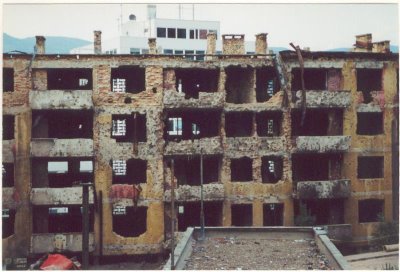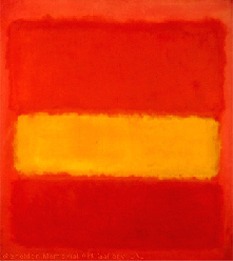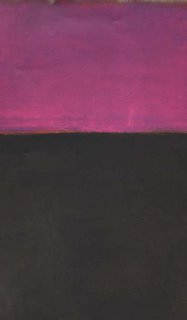For Matthew
the sun warmed
a tired face
and softly
she whispered
I love you
and the sky
bluer than blue
welcomed Matthew
into the world
Monday, July 31, 2006
Friday, July 28, 2006
pEAR-hALVES7*
That morning, this one, mutton gray, marbled with gristle and hock shoulder, boiled beyond recognition. The entire world boiled in the same pot, meat and potatoes, carrots and parsnips, calf’s tongue, tripe, a liver, shoeblack with cirrhosis and whiskey, and great aunt Alma’s raspberry tarts mince with sugar and allspice, the scum rising to the top of the simmer. An empanada, that’s what he heard, overheard, the man in the hat, ritornelli of oboes, French horns, clarinets, cellos and the clashing of cymbals, a symphonic dissonance, an upheaval, an inharmonious cacophony, and not a dog in sight.
He often saw this one man, a beggar, with an almsman’s hat and a tic, sitting on a flap of cardboard box, his feet splayed like pear-halves in front of him. When the man in the hat hadn’t seen him in over a month, he wondered where he gone, and why. When next he saw him, espied from a distance, sitting, legs akimbo on his flap of cardboard, he noticed that he had lost a considerable amount of weight, forty pounds, an entire leg’s worth of weight. The ticking had worsened, to the point where, much as he tried, he couldn’t contain it, his lips and forehead ticking and trembling absurdly, his eye, the left one, marking off time like a metronome.
He, the man in the hat he, went into the library and found a book on ticking and quaking, on such things as jimmy-leg and palsy, Gherkin’s disease and somnambulism, a medical compendium of pathologies and corporeal afflictions. He read, burrowed into the cornered of the stacks like a dormouse, his hat placed on the table next to him, as hats, as he had learned, were frowned upon in public reading rooms, until his eyes watered and stung like lye. In the chapter of Maladies of the Intellect, he came across a folio on nervous diseases and psychiatric infirmaries, and having read almost to the end, he saw the subtitle, Pharmacological Interventions and their side effects. He read that certain antipsychotic drugs could cause unsavory side effects, one of which was uncontrollable ticking. As he read on, his eyes briny with sweat (which his hatband generally prevented from scalding his eyes) he came to understand why the almsman had lost so much weight in so short a time. The folio explained that people so inflicted, the savant and the neurotic, the schizophrenic and the addle-minded, suffered from repeated medication changes, which caused either rapid weight gain or loss. He gathered from this, from the folio’s authors, that the almsman had one of these inflictions of the intellect, and had recently had his medication changed.
Lithium and bishoprics, Librium and therapeutic Quaaludes, a peasant’s broth of anti this and anti that, a pharmacopoeia of stimulants and depressants, uppers and downers, tablets and pills that made you constipated and disaffected, once removed from the couture of life. He had heard, somewhere, overheard, that some of these poor sods refused to take their pills, tablets and salts, substituting alcohol and street drugs, tonics and tinctures, morphine diluted with commode water, grains pulverized into a fine euphonic sift, best savored on the tripe of the tongue, a cumquat with no seed or spidery insides. An arm gone blue where the tubing cinches the elbow, just above the crook, the needle hooking a vein like a throw rug, fingers knitting curlicues in tarn thickened skin. Blood roe, a sanguine life force basted with morphine and hex, and the smell of camphor and junk sickness, like an abattoir after the last hammer puts the crinkle in a bull’s legs.
Graves are deeper around the edges, where the shovel heels into the hard topsoil, mulching grass, dirt and scrawl. His grandfather, the man in the hat’s, drove a fish truck for the Mercury Fish Company. Having one leg as he did, he double-clutched with a dowel attached to the skirt of his trousers, shifting gears with his right hand, the left one grappling with the steering wheel.
He often saw this one man, a beggar, with an almsman’s hat and a tic, sitting on a flap of cardboard box, his feet splayed like pear-halves in front of him. When the man in the hat hadn’t seen him in over a month, he wondered where he gone, and why. When next he saw him, espied from a distance, sitting, legs akimbo on his flap of cardboard, he noticed that he had lost a considerable amount of weight, forty pounds, an entire leg’s worth of weight. The ticking had worsened, to the point where, much as he tried, he couldn’t contain it, his lips and forehead ticking and trembling absurdly, his eye, the left one, marking off time like a metronome.
He, the man in the hat he, went into the library and found a book on ticking and quaking, on such things as jimmy-leg and palsy, Gherkin’s disease and somnambulism, a medical compendium of pathologies and corporeal afflictions. He read, burrowed into the cornered of the stacks like a dormouse, his hat placed on the table next to him, as hats, as he had learned, were frowned upon in public reading rooms, until his eyes watered and stung like lye. In the chapter of Maladies of the Intellect, he came across a folio on nervous diseases and psychiatric infirmaries, and having read almost to the end, he saw the subtitle, Pharmacological Interventions and their side effects. He read that certain antipsychotic drugs could cause unsavory side effects, one of which was uncontrollable ticking. As he read on, his eyes briny with sweat (which his hatband generally prevented from scalding his eyes) he came to understand why the almsman had lost so much weight in so short a time. The folio explained that people so inflicted, the savant and the neurotic, the schizophrenic and the addle-minded, suffered from repeated medication changes, which caused either rapid weight gain or loss. He gathered from this, from the folio’s authors, that the almsman had one of these inflictions of the intellect, and had recently had his medication changed.
Lithium and bishoprics, Librium and therapeutic Quaaludes, a peasant’s broth of anti this and anti that, a pharmacopoeia of stimulants and depressants, uppers and downers, tablets and pills that made you constipated and disaffected, once removed from the couture of life. He had heard, somewhere, overheard, that some of these poor sods refused to take their pills, tablets and salts, substituting alcohol and street drugs, tonics and tinctures, morphine diluted with commode water, grains pulverized into a fine euphonic sift, best savored on the tripe of the tongue, a cumquat with no seed or spidery insides. An arm gone blue where the tubing cinches the elbow, just above the crook, the needle hooking a vein like a throw rug, fingers knitting curlicues in tarn thickened skin. Blood roe, a sanguine life force basted with morphine and hex, and the smell of camphor and junk sickness, like an abattoir after the last hammer puts the crinkle in a bull’s legs.
Graves are deeper around the edges, where the shovel heels into the hard topsoil, mulching grass, dirt and scrawl. His grandfather, the man in the hat’s, drove a fish truck for the Mercury Fish Company. Having one leg as he did, he double-clutched with a dowel attached to the skirt of his trousers, shifting gears with his right hand, the left one grappling with the steering wheel.
Thursday, July 20, 2006
bLACK cOFFEe and cANE sUGAR7*
He felt, the man in the hat felt that is pineal gland had decamped, taking refuge in his hypothalamus, somewhere other than where it should be, was suppose to be, his pineal gland. He had heard about this once before, eavesdropping on a couple chatting animatedly over steamy cups of coffee, black coffee stropped with cane sugar and sweetener. The one said to the other, the one that was busy picking a scab from the knoll of her finger, ‘you know the pineal gland is wont to travel, pick up roots and move,’ he said, the one speaking, cleared his throat, ‘to the back of the head, the skullcap, the ganglia knot’. The other one, the one nitpicking at her finger, said, ‘no.’ that was the end of the conversation, the one the man in the hat had eavesdropped in on. He extrapolated what he overheard to how he felt, how he didn’t feel he felt, how he should feel but didn’t. When he felt like this, which he did, though infrequently, the man in the hat would apply a mustard poultice to the back of his head, where he thought the pineal gland sat, or drink a Fanta orange with minced ice. He would eat raw asparagus corm with salt and vinegar, his lips chapped with brine and lye vinegar. By smacking his lips together he could alleviate the sting and canker in his mouth; the tip of his tongue starch with malt and wither. His great aunt Alma showed him how to salve a wound with mayonnaise, and how to edge a pie crust with a fork, his eyes trained on the copse of her forehead, a burl of gray hair tucked behind her ear, her apron white with refiner’s sugar and flour. The sky through the kitchen window, her window, great aunt Alma’s window, was always blue, mallard blue, turquoise blue with a hint of teal and cobalt. The man in the hat didn’t think thoughts, but rather imageries, templates he thought onto, his imageries and memories, recalls and rebuses. In this manner, every thought, every new thought, was an original thought, an a priori thought, thought in images and rebuses. Every thought was a new thought, an imagery attached to a past memory or recall, but one that was entirely different, a reconstructed thought, not selfsame or similar, but once removed from the first thought, the thought that started it all; the first thought, thought when he began to think thoughts. But, if his pineal gland had, in fact, relocated, taken refuge in the back of his head, in the ganglia knot, then everything he thought he thought, imageries, rebuses, recalls and memories, were moot, unpredictable, sketchy and unbalanced. His brain, he felt, might now be nothing more than an Etcher-Sketcher, full of pencil lead and carbon, something that had to be shaken to erase the last image or thought, an antecedent, an a priori of the first thought, thought.
Tuesday, July 18, 2006
dEATH-lIFE-lIFE-dEATH7*
The man in the hat awoke one morning and thought, what if I am dead but don’t know it? What if I awakened dead, not living, how would I know the difference? What if what I took to be living was death, but I confused the two, put the one in front of the other, got them mixed up, muddled? What if death, being dead, is just life, but in reverse, death-life-life-death? Could one live with that, he thought, having it backwards, in reverse? Maybe I’m dead and waiting to wake up, to begin living, death-life. If I have this all backwards, back to front, he thought, what then? Where to begin, how to begin, why to begin, so much turmoil and puzzlement, addles the mind, he thought, like soppy porridge. This type of thinking made the man in the hat wonder, why did Charlton Heston hold his nose when he dove out of the sinking spaceship into the reservoir? Strange indeed, not a volitional thought in his head, Charlton Heston’s head, sad indeed: mercenary sad. The man in the hat, the broad brimmed hat, felt that life had neither reason nor rhyme, but was simply a random series of reoccurring events, some occurring more often than others. Charlton Heston held his nose because he was a sissy, not because of some greater ontological wherewithal, some categorical imperative. If he recalled, the man in the hat, Charlton Heston likes pistols and long-rifles, stun-guns and carbines, creosote and cannon powder, residues of a poor education and a middling intellect.
Friday, July 14, 2006
gRAVY and sALT cRUET*7
I will organize an old person’s fair, thought the man in the hat; where they could display, show off, they’re infirmaries; they’re toil nails and wean-tongues. There would be dancing and jumping, and a table reserved for confectioners and podiatrists. And a potluck dinner, with beans and gravy, salt-cruet and sappy meats, like boiled pork shoulder and minced dog, organic teas and after dinner mints, and wafer-thin after-eights, moil with chocolate and crème de menthe. Should his bad leg permit it, the man in the hat would ride a unicycle, to disprove the theory that all things seek they’re fatigue, they’re entropic fatality. He, the man in the hat, the Nietzschian tightrope walker on one wheel, gamy legged, wide brimmed hat wet through with slaver and Burgee’s. A codpiece, yes, he thought, a codpiece would be appropriate, cupping the foppery of his trousers, a votive coopery, bunghole tamped into place. The monocycle, yes, the tires choused down to the rims, flails and burrs of steal ribbing clacking against the pavement.
Wednesday, July 12, 2006
qUEEQUEGIAN tREE-nAILS7*
And the seizures, palpitations, colic, the fill-tilt throttle of a chest endemic with waste. Lung sacs bloated with corpse gas and fennel root. A peppermint sweetie lolled on the wean of the tongue, the curial for whooping, arrhythmia and sleepy-leg. Not for the faint of heart or weepy. He, too, the man in the hat, would become one of these, one of them, a colicky old man with incurable whooping and bird’s talon toe nails, a shamble legged man, a clochard. And they’re toil nails, old people, like split shale browned with nicotine, curled and striated, fucking mercenary indeed. Queequegian tree-nails, pounded into keel wood and jury-mast, and the whooping and sulfa smell, redolent of death and bad grooming, crumble and fester.
Tuesday, July 11, 2006
sULFANILAMIDE7*
The bus smelled (or was it redolent?) of incontinence and peppermint, pocket candies worsted in cellophane, for staving off bad breath and whopping. He, the man in the hat, had a fear of old people, their sidling and bad posture, the manner in which they spoke in rhymes and anagrams, their funny hats and brown shoes. Yes, its true, he too had a sidle-leg, one trumped to the end of his foot, but he had learned how to walk without giving it away, drawing attention to his gaminess, his hobbling, the heel of his shoe striking the pavement like a matchstick. Old people smelled like sulfa, sulfanilamide, penicillin, death put on hold, in abeyance, staved off with phlebotomies and chalky suppositories. And the mints, wintergreen and anise, humbugs and licorice allsorts, a confectionary of malts and oil.
Sunday, July 09, 2006
dAY to dAY pODIATRY7*
The man in the hat did not wash his feet on Sundays, not out of religious observance or the fear of a payback by some unseen godhead, but as a reprieve from the drudgery of day-to-day podiatric cleanliness. Like a bed bugged clochard, the man in the hat ate bread rinds and marmalade compote, peal ends slurry with rime and allsorts. The bus smelled (or was it redolent?) of incontinence and peppermint, pocket candies worsted in cellophane, for staving off bad breath and whopping.
Subscribe to:
Posts (Atom)
About Me

- Stephen Rowntree
- "Poetry is the short-circuiting of meaning between words, the impetuous regeneration of primordial myth". Bruno Schulz
Blog Archive
Links
- Windows Tuneup
- Apmonia: A Site for Samuel Beckett
- Bywords.ca
- Dublin Time and Day
- fORT/dAfORT/dA
- Google News
- John W. MacDonald's Weblog
- New York Freudian Society
- Sigmund Freud-Museum Wien-Vienna
- Stanford Encyclopedia of Philosophy
- Taking the Brim _ Took the Broom
- The Blog of Amanda Earl
- The Brazen Head: A James Joyce Public House





